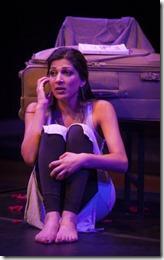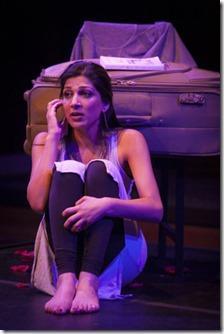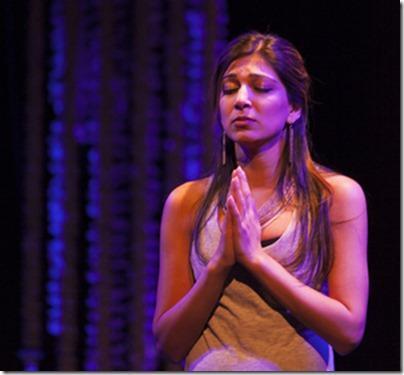
One-woman show goes to places we don't expect

Review by Catey Sullilvan
Minita Gandhi's autobiographical, one-woman show starts out in familiar territory: The U.S.A.-raised daughter of traditional Indian parents, she clashes with her mother and father over her career choice, romantic prospects, and her sex-positive feminism.

An engaging performer, Gandhi plays over a dozen characters in what initially feels like a fairly predictable story of generational and cultural differences. But roughly two-thirds of the way into the actor/playwright's Muthaland , things take a dark turn. The easy laughs vanish. The narrative spins into an anxiety-provoking story of frightening misogyny and the brutally powerful systemic socio-political traditions that protect those who inflict it.
Directed by Heidi Stillman, is compelling but not entirely successful. Gandhi is skilled actor with excellent comic timing and a gift for conveying intense emotion. But some pieces of the 90-minute work don't mesh. is almost two entirely different plays - the first is a gentle rom-com/self-help odyssey in the vein of "Eat Pray Love," (which is referenced several times). The second is a troubling story about fighting for a modicum of justice from a place where, for women anyway, justice can be almost non-existent.
In the end, these disparate elements don't entirely gel. ties things up with a relatively tidy bow in the final scene, but the resolution seems like a facile postscript that diminishes the events that have preceded it.
The thru-line that attempts to connect both sides of is Gandhi's family, and her relationship with them. Her father arrived in the United States with little more than a suitcase, a prop that bookends the narrative.
Braving an ocean on the power of his determination to make a better life, Gandhi's father succeeded by any measure you'd care to apply. Gandhi and her siblings were raised in the middle-class comfort that, for many, embodies the American Dream. And despite her parents' initial disapproval, Gandhi studied acting in college with their support.


Initially, focuses on the quirky comedic aspects of an independent young woman attempting to deal with her conservatively protective parents. Gandhi's experiences with her parents are an illustration of culture clash to be sure, but they are mostly not specific to her Indian heritage. Anybody who has fought with a disapproving parent over a romantic relationship or a job or money will recognize the dynamic at play; it shows up in pretty much every YA novel and teen movie in existence.
Their disagreements are highlighted as Gandhi prepares for her brother's wedding, an event that puts her own single status into harsh relief. She's shocked by her brother's decision to enter into an arranged marriage and stressed over the thought that - per her gynecologist - she only has two years left before her child-bearing capability starts seriously withering.
The wedding ceremony takes place in India, and the voyage to India yields a life-changing journey for Gandhi. Giving any more detail would result in spoilers; suffice to say that as her parents warned, India can be a terrifyingly hostile place for young, single women.

Stillman keeps moving at a compelling clip. Gandhi morphs into an impressive array of characters ranging from her parents to her gynecologist to the man she loved and let go. She is also a dancer: there's an enchanting scene where she recreates the traditional choreography she performed at her brother's wedding.
But while the "Eat-Pray-Love"-lite sensibility of the first half of is amusing, Gandhi's story doesn't become truly compelling until it moves to India. It's there that turns into a true testament to resilience and bravery under the most harrowing of circumstances. Minus the cutesiness that defines the earlier scenes, becomes an intense saga of bravery. Gandhi's articulation of the events in ferocious, painful detail is all-encompassing.
It's that fierceness that is missing from the early parts of . Gandhi is a powerful performer with an extraordinary story. She'd do well to edit back the typical adolescent and young adult angst and focus on what follows.
continues through October 7th at Berwyn Cultural Center's 16th Street Theater, 6420 W. 16th Street, Berwyn (map), with performances DATESnTIMES. Tickets are $18-$22, and are available by phone (708-795-6704) or online through PrintTixUSA.com (check for availability of ). More information at 16thStreetTheater.org. (Running time: 90 minutes, no intermission)

behind the scenes
Heidi Stillman (director), Minita Gandhi (playwright), Jesse Gaffney (props design), (light design), Barry Bennett (sound design), Lavina Jadhwani (dramaturg), Lanise Antoine Shelley (voice and movement), Maeli Goren (asst. director), Wendye Clarendon (stage manager)
Tags: 16th Street Theater, 17-0906, Barry Bennett, Berwyn Cultural Center, Cat Wilson, Catey Sullivan, Chicago Theater, Heidi Stillman, Jesse Gaffney, Lanise Antoine Shelley, Lavina Jadhwani, Maeli Goren, Minita Gandhi, post, Wendye Clarendon
Category: 16th Street Theater, 2017 Reviews, Catey Sullivan, One-Man Show

